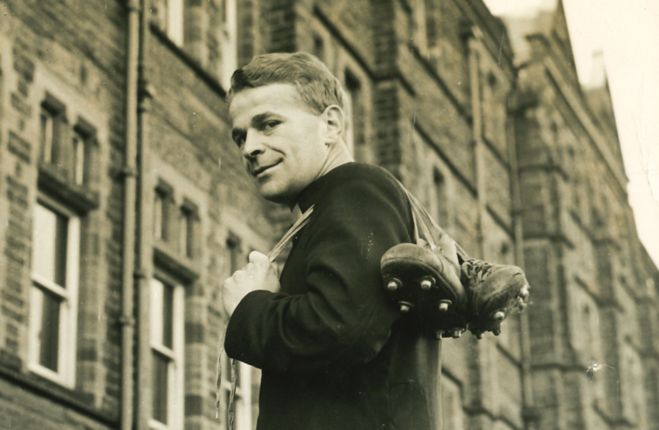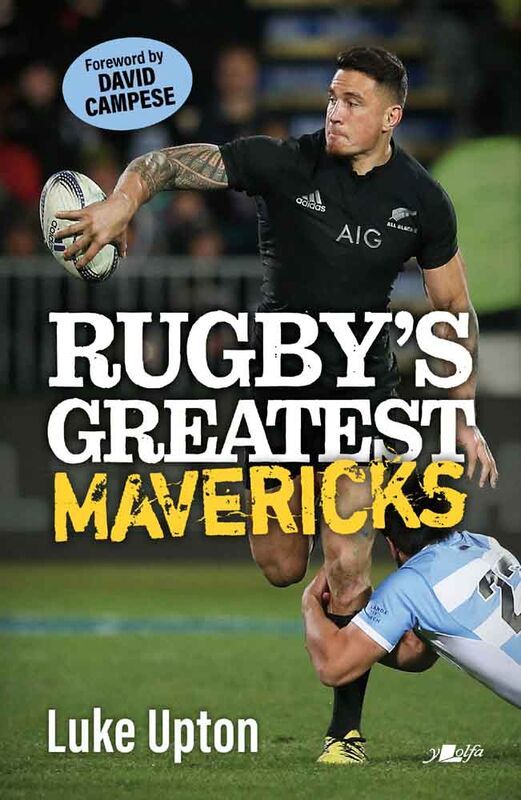The following passage is an extract from ‘Rugby’s Greatest Mavericks’ by Luke Upton, which was published on 22 October by Y Lolfa, and can be ordered here.
LIMERICK ON WEDNESDAY 14 January 1970 was a powder keg ready to explode.
The Springboks were in town. And the city was divided.
In the chaos surrounding the ground pre-game, one former Munster favourite and full Irish international had just arrived from England. He was not in Limerick to watch the game and catch up with old friends and teammates, though many would greet him warmly. No, his purpose was to protest the welcoming of a team that he saw as representing an immoral regime. When he played, he was known as Marnie Cunningham, but now he was Father Marnie.
And he wasn’t happy.
Cunningham would tell an Irish Times journalist part of the reason for his anger: “I have a friend in South Africa who is as good as any man on this Springboks team, but he cannot even watch a match there now because he is ‘Coloured’ [the South African term for someone of mixed ethnicity]. I would love to watch the match, but I cannot support racialism.”
The same journalist counted at least 25 clergymen entering the ground as spectators. Cunningham would be the only man of the cloth protesting.
His story begins in Cork, 37 years earlier. Born Martin John Cunningham. he was known to all as Marnie (though his name has widely appeared posthumously as Marney, this is not how he spelt it). Educated at the city’s Presentation Brothers College, a school with a strong rugby heritage listing many who have played for their country as former pupils – Ronan O’Gara, Peter Stringer and Simon Zebo, to name just a few – Cunningham first came to playing prominence whilst at University College Cork, whom he helped to win the Munster Senior Cup in 1955. From there he went on to play for Cork Constitution, which his father Jack had previously captained, before being selected for Munster (as would his brother Joe).
Marnie received a call-up for Ireland at the age of just 21 and made his debut in a 3-5 defeat against France in January 1955. A fellow debutant that day was Tony O’Reilly, who would shine for Ireland and the Lions before a remarkable business career that would see him become Chairman of food giant Heinz (the first non-Heinz family member to hold that position) and CEO of Irish media conglomerate Independent News & Media (INM), before going bankrupt in 2017.
Back then O’Reilly was just a callow teenager, whose indecision led to the decisive try for France. He remembers well the no-frills instructions that debutants were given, having to bring their own “training togs, clean white knicks, towel and soap” and be sure that their boots were in a “playable condition”.
Also lining up with Cunningham that day was another special player, Jack Kyle. He made 46 appearances for Ireland, then a world record when adding in his six Tests for the Lions, and was a member of the Grand Slam-winning side in 1948. In 2002 he was voted the Greatest-Ever Irish Rugby Player by the Irish Rugby Football Union. Few who saw the scenes of him congratulating Brian O’Driscoll in Cardiff in 2009, when Ireland ended a 61-year wait for another Grand Slam, will forget them. The torch was truly passed on at that moment. But like O’Reilly, and indeed Cunningham, it was his post-rugby days that he became most known for. A doctor, he spent the years 1966 to 2000 serving Chingola, a mining town in Zambia, where he became a hugely important and beloved figure.
Cunningham would play seven times for his county, with his last appearance being a try-scoring one in a famous win 11-3 over Wales at Lansdowne Road in 1956, a triumph which deprived the visitors of a Grand Slam. A report at the time stated, “our forwards were rampant and most outstanding of the lot, Cork’s Marnie Cunningham, broke through two tackles for the try, which put the issue beyond doubt.” Many considered him unlucky not to have been selected for the Lions tour of South Africa in 1955, although he did represent Irish Universities and the Barbarians.
It wasn’t form, or injury, or even rugby league that ended his international career at the age of just 22. No, it was a higher calling – the Catholic priesthood.
I spoke to Paul Cunningham, Marnie’s nephew and also an ex-Munster and Ireland A hooker, and asked if this move was something the family had been expecting.
“Absolutely not. The family would attend Mass but weren’t hugely religious. He told everyone he had some news, but people thought it was about a job, or perhaps a girl – but no, it was becoming a priest.
“I don’t think there was a particularly dramatic event that made him decide this, but he never, ever regretted it. And his sister Marie would later also enter religious service, becoming a nun in the Dominican order.”
‘Rugby’s Greatest Mavericks’ by Luke Upton was published on 22 October, and can be ordered here.
The book also includes profiles of Moss Keane, David Campese, Ray Gravell, Danny Cipriani, Finn Russell, Prince Alexander Obolensky, Non Evans, James Small and many more.


